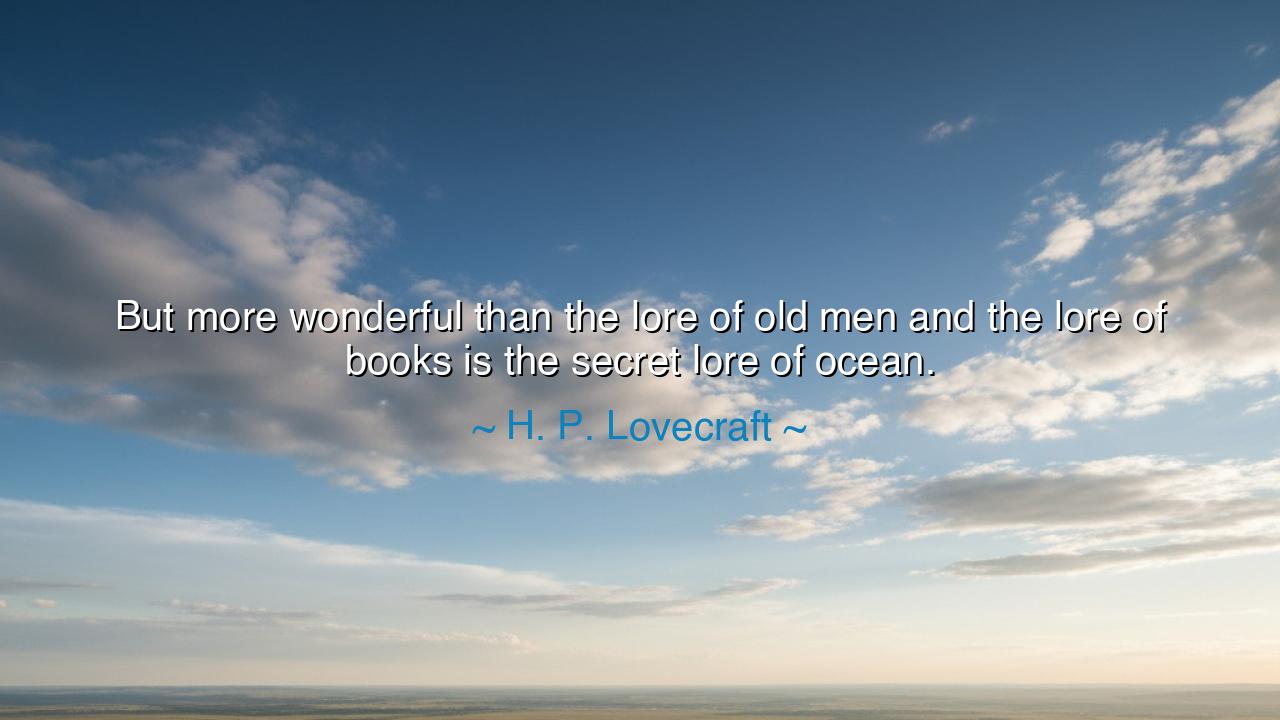
But more wonderful than the lore of old men and the lore of
But more wonderful than the lore of old men and the lore of books is the secret lore of ocean.






H. P. Lovecraft, the weaver of cosmic mysteries, once wrote with awe: “But more wonderful than the lore of old men and the lore of books is the secret lore of ocean.” In these words, he reminds us that while human knowledge—whether preserved in age or in scripture—is vast, it pales before the eternal mysteries of the natural world. The ocean, with its unfathomable depths and ceaseless tides, holds secrets no scholar can wholly capture. It is not merely water; it is the living library of creation, older than memory, deeper than thought.
O listener, consider the contrast Lovecraft makes. The lore of old men is wisdom distilled from years of experience, and the lore of books is the written treasure of civilizations. These are noble, precious, and sacred. Yet even these cannot equal the ocean, for its depths are older than any sage, and its waves are inscribed with stories long before ink was invented. Where man’s wisdom is finite, the sea’s wisdom is infinite; where books are bound in covers, the sea is boundless.
History gives us glimpses of this truth. When Ferdinand Magellan set sail to circle the world, he relied on maps, charts, and the lore of explorers before him. Yet those maps ended, and beyond them stretched only the ocean, holding secrets no human had yet named. It was only by venturing into that living mystery that he discovered new lands, new currents, and new truths. Thus the ocean proved itself a greater teacher than any parchment, rewarding those bold enough to seek its hidden lessons.
Lovecraft himself, though steeped in books and the libraries of Providence, was haunted by the vastness of the sea. To him, the ocean was not only mystery but also terror, a reminder of mankind’s smallness against eternity. The crashing waves whispered of forgotten civilizations, the deep trenches of unimaginable creatures, the endless waters of forces beyond comprehension. Herein lies the origin of his words: he saw in the sea a lore that humbles, a lore that no man could tame, a lore that makes the proudest intellect bow before the unknown.
Yet we must not hear only fear in his words; we must also hear reverence. For the ocean is both destroyer and nurturer. It swallows ships, yet carries trade. It drowns empires, yet gives life to the smallest fish and the greatest whale. Its tides govern the rhythms of the moon, its waves shape the coasts, and its depths still conceal mysteries greater than any human invention. To approach the sea is to stand before the eternal, to sense both danger and divinity.
The lesson for us is clear: seek wisdom in men and in books, but never forget to listen to the ocean and to nature itself. The world is not only written in words—it is sung in waves, etched in mountains, breathed in winds. Let your learning not be confined to classrooms and libraries, but expanded by rivers, forests, seas, and skies. For there lies the secret lore that no master can give you, but which every soul may receive if it listens deeply enough.
Therefore, children of tomorrow, stand before the ocean with humility. Watch its tides, listen to its roar, and know that you are in the presence of wisdom beyond time. Learn from the old, learn from the books, but also learn from the waves that speak of eternity. For the greatest lore is not always written on parchment, but carried in the heartbeat of the earth itself.
For in the end, Lovecraft’s words are both warning and gift: that human knowledge, though vast, is not complete; that beyond our understanding lies an ocean of mystery. Approach it not with arrogance, but with wonder. For the secret lore of the ocean is the eternal reminder that life’s deepest truths are not given—they are discovered, wave by wave, in humility and awe.






AAdministratorAdministrator
Welcome, honored guests. Please leave a comment, we will respond soon